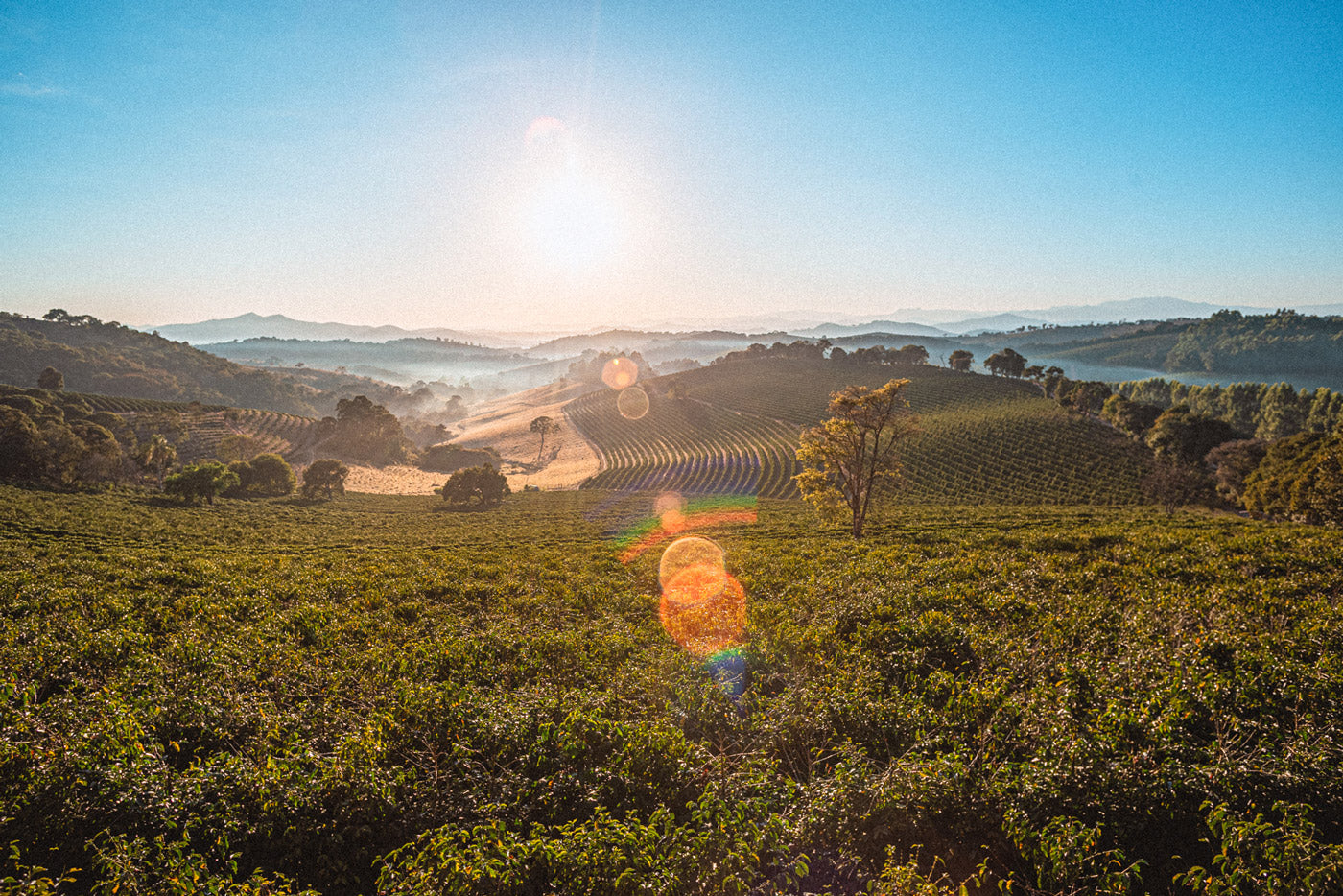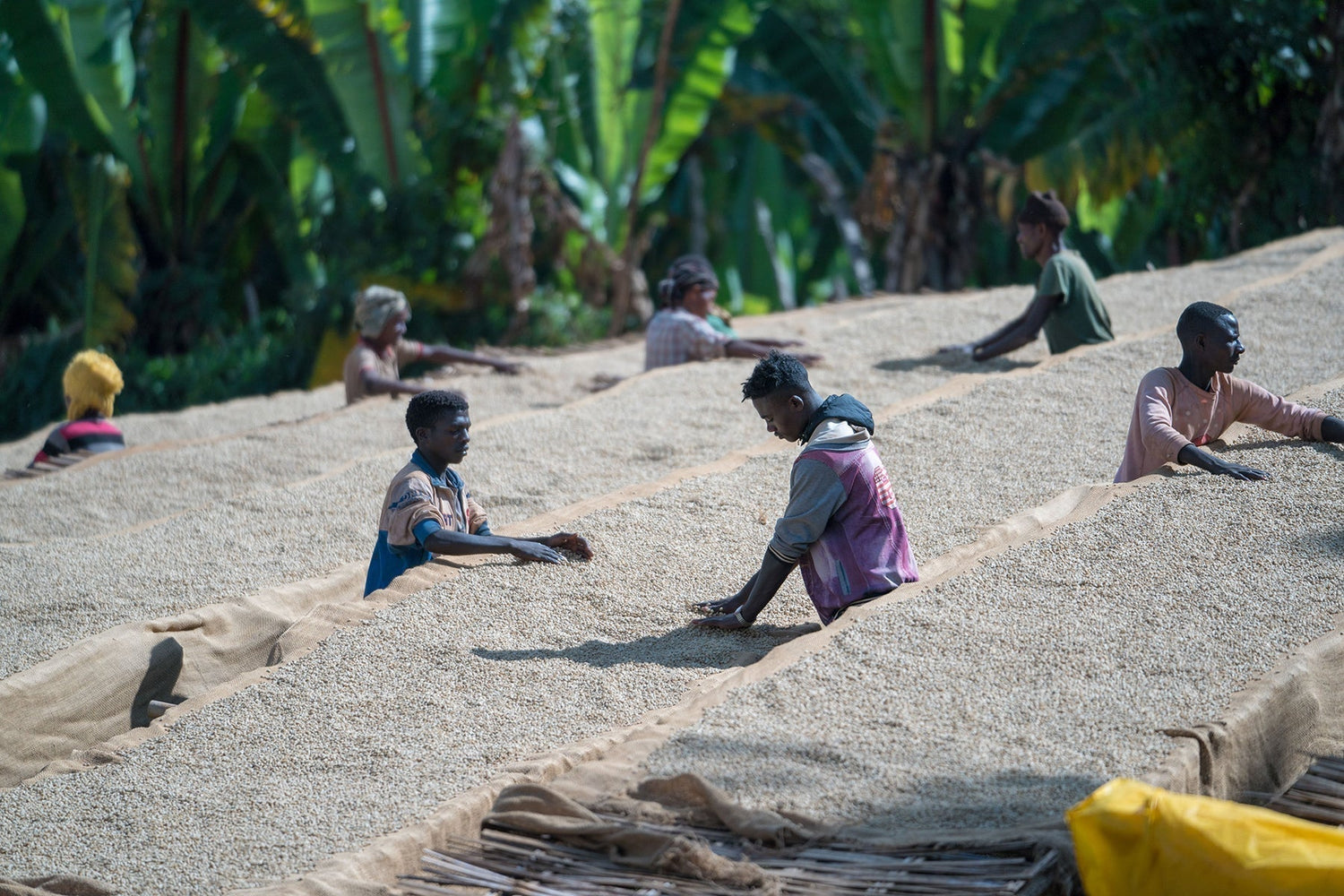Coffee from Rwanda is one of the best in the world . The fine floral and fruity notes make the coffee so special. That's why coffee from Rwanda cannot be missing from our range. In the next few lines we will show you what is behind our coffee from Rwanda and, above all, who ensures the high quality of our green coffee from East Africa.
Since 2018, we have been sourcing all of our green coffee from Rwanda through Eric Wright. Eric is 32 years young and is not only responsible for the consistently high quality of our coffee deliveries, but also for the existence of more than 800 farmers who work for him. Eric actually didn't have much to do with coffee at first. The American-born man studied law and worked for several years as a lawyer in the United States.
Project Coffee from Rwanda by Eric Wright
The interest and enthusiasm for high-quality coffee only developed over the years. In 2017, Eric launched the Community Coffee Rwanda project and leased a washing station in the south of the country.
Two years later, Eric invested in an area in Rwanda that at the time was not yet growing coffee for export. The locals, who rarely see a white person, initially viewed him with skepticism. Nevertheless, Eric rented two washing stations and made it his goal to promote the cultivation and marketing of green coffee from Rwanda and to work directly with small local farmers. To find out more about his ideas, we interviewed Eric.

How many washing stations do you operate?
In 2019, I leased two washing stations for a period of 7 years : Karongi District and Ngororero District. Both districts are located in the Western Province of Rwanda. Because small farmers lacked the resources and knowledge about the care and cultivation methods of coffee plants, no coffee was grown in the region for many years.
Who are the buyers of your project coffees?
I only sell my green coffee to friendly roasters. The personal relationship with my customers also motivates me to sell a consistently high quality product. The high standards I set for myself often mean that I have to sort out part of the harvest in order to ensure the correspondingly high quality .
But that is exactly what sets me apart from other exporters: for me, the quality and not the quantity of the green coffee is the most important thing. The coffee that ultimately reaches the roasters should give the end consumer a special taste experience .

How many employees are involved in your coffee project?
I currently employ 800 farmers and managers . I rely on employees under 25 years of age on my management team. My experience has shown that they see coffee as a great opportunity for themselves and their country. The older generations, on the other hand, mainly see the profit that comes from the plant. It is often difficult for them to grasp that the coffee plants require a certain amount of care and attention.
How do you ensure the consistent quality of the green coffee?
In general, it is not easy to achieve consistently high coffee quality in Rwanda. As already mentioned, the older farmers in particular do not take sufficient care of their coffee plants . Nevertheless, the farmers expect a constant payment from me. My job is to encourage a change in thinking and to teach the farmers that special care and the higher quality yields that can be achieved as a result bring with it higher pay. Unfortunately, it is currently still the case that the farmers also take inferior coffee cherries to the washing stations. I, in turn, am forced to take the entire quantity and pay them, even though only a small proportion is suitable for further processing.
How are the farmers trained in the coffee project?
Let's come back to our Coffee School Project in El Salvador. Logically, we also need a coffee producer who is involved in the processing and cultivation of coffee according to the standards of organic farming and, above all, knows the local conditions. Rodolfo Ruffati comes from El Salvador and therefore knows the local conditions like no other. Rodolfo is a 5th generation coffee farmer and now also a coffee producer and has been working strictly according to the principles of organic farming for over 10 years .
This led to an early connection with Leonhard Wild and the Wild Coffee Roastery. Today, Rodolfo is fully responsible for the Coffee School project and supports the local community. His main goal is to train future farmers and coffee producers so that coffee cultivation in El Salvador slowly but surely experiences a significant upturn.

What is Umusazi or Uruhu all about?
I had the vision to create something new. A brand that was different, unusual and a little crazy. My goal was to get the sweet taste from the cherry skin into the coffee bean and thus create an extraordinary taste experience. In the usual process, the coffee cherries are harvested and then the coffee beans are freed from the surrounding skin. With Uruhu, however, the fruit is fermented together with the skin in tanks for 72 hours and dried in the sun for 32 days . The green coffee beans are then sorted by hand a total of three times. At the moment there are two to three producers in Rwanda who follow this type of processing.
"What makes our batch so special...?"
What makes our batch so special is the intensive and careful sorting of the coffee cherries beforehand. We don't throw green, yellow and red fruits together , but rather sort them out precisely. We also increase the fermentation period. With this method, we keep the aroma of the cherry fruit in the bean. Basically, the process is nothing new, as Natural Wines has been using this process in winemaking for a long time.
Of course, the coffee should also have a suitably unusual and special name. Umusazi means crazy. However, the Rwandan government was against this name. So I changed it to Uruhu, which means skin. I find the name Uruhu extremely apt, because the skin plays a major role in the taste of my coffee.

What coffee projects are you planning for the future?
I definitely don't lack visions and ideas. My main focus is of course to convey to the farmers that they can trust me and that I want to continue to support their families in the future. I am currently using the time after the coffee harvest to train the farmers even better and show them what is important in growing coffee. Small farmers in particular cannot earn their living from growing coffee alone . That is why I want to promote the cultivation, production and export of fruit, honey, wax and other products in the future and thus create further income opportunities for the farmers. My goal is for small farmers in Rwanda to be able to live better off their earnings all year round.


